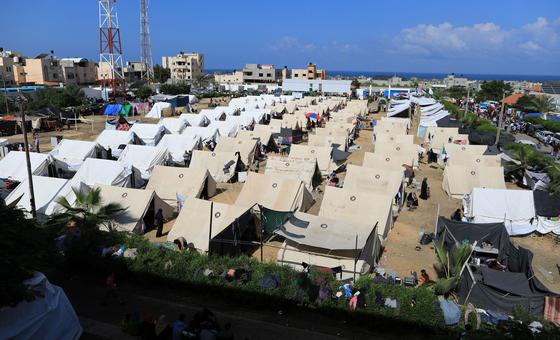In a wide-ranging briefing to journalists in Geneva, UNRWA Commissioner-General Philippe Lazzarini reiterated calls for a ceasefire and addressed misinformation targeting the agency, including claims that aid is being diverted.
He said he has also received reports of UN schools being used “for military purposes”.
Commitment in crisis
During the briefing, Mr. Lazzarini said he had received reports that Gaza was under a communications blackout due to the lack of fuel.
He repeated his earlier warning that UNRWA is running out of fuel, thus putting lifesaving support to 2.2 million in Gaza at risk. Everything from aid delivery, to water supply, to even accessing cash from ATM machines will be impacted.
“We will not be able to uphold our commitment to provide for the Palestinian people any longer,” he said. “I do believe there is a deliberate attempt to strangle our operation and paralyse the UNRWA operation.”
Exodus from the north
Mr. Lazzarini outlined the total devastation of nearly six weeks of conflict which he said has sparked the largest displacement of Palestinians since 1948.
Thousands of people have fled northern Gaza for the south, arriving “dehydrated, hungry, exhausted and shell-shocked.”
UNRWA schools are now hosting more than 800,000 people amid dire conditions and lack of food, water and adequate sanitation. Up to 40 per cent of people in shelters are already exhibiting skin illnesses.
UN shelters hit
He also addressed some of UNRWA’s latest concerns as well as “misunderstandings” or “misinformation”.
Although people have been evacuating from the north, one-third of all killings have occurred in the south, he said. He stressed that “there is nowhere safe in Gaza”, including UN compounds.
“Up to 60 of them have been hit since the beginning of the conflict. We had more than 60 people now killed. We had hundreds of people injured,” he said.
UNRWA deaths mount
He provided an update on UNRWA losses, with at least 103 staff now confirmed killed although the number could be higher. He described these colleagues as UN civil servants dedicated to serving the community who “had absolutely nothing to do with the conflict per se.”
Mr. Lazzarini also responded to articles that said UNRWA schools teach hatred, which he flatly refuted. He said the agency has “zero tolerance” for hate speech, racism and incitement to discrimination, hostility, or violence.
Condemnation and clarifications
“UNRWA rejects claims linking its personnel and schools to the abhorrent 7 October attacks in Israel; attacks that UNRWA has condemned in the strongest terms and which I will always continue to condemn,” he said.
He questioned “the motivation of those who make such claims through large advocacy campaigns, especially under these current circumstances.”
He further emphasized that UNRWA does not let aid get diverted as the agency directly implements its programmes without intermediaries.
“Whenever we work with suppliers, they are systematically checked against sanction lists,” he said, adding that the names of all staff are sent to the Israeli authorities each year.
“In reality, we are certainly one of the most scrutinized organizations,” he said.
UN facilities ‘violated’
Mr. Lazzarini reported that UN facilities “have been violated over the last six weeks quite regularly”.
In recent days he has received reports that several UNRWA schools have been used for military purposes “including a recent discovery of weapons in schools and including the positioning of Israeli forces in at least two UN schools.”
Journalists repeatedly asked for clarification.
“I have received or heard reports and allegations- again, I’m not in a position to confirm it– that…in the north, where we have a ground military operation, that reportedly there might have been weapons found in schools. And reportedly also we heard through social media that there have been also Israeli military forces positioning in UN compound,” he said at one point.
He stressed that this was a “blatant violation” which also endangers UNRWA colleagues on the ground.
“If this information (is) correct, it needs to be pushed back and condemned,” he said.
Sewage in the streets
Regarding dwindling fuel supply, Mr. Lazzarini recalled that he first sounded the alarm three weeks ago. UNRWA was able to “tap into the remaining fuel in the Gaza Strip” in the interim, and always through coordination with Israel.
While the agency received a “tiny shipment” of fuel – half a truck – on Wednesday, he said “it was delivered with conditionalities”. The fuel can only be used for trucks collecting goods arriving at the Rafah crossing with Egypt, meaning that water desalination plants, sewage pumping systems or bakeries will go without.
“As from yesterday 70 per cent of the population just in the south has no access anymore to clean water, and as of today, we have raw sewage starting to flow in the streets,” he said.

